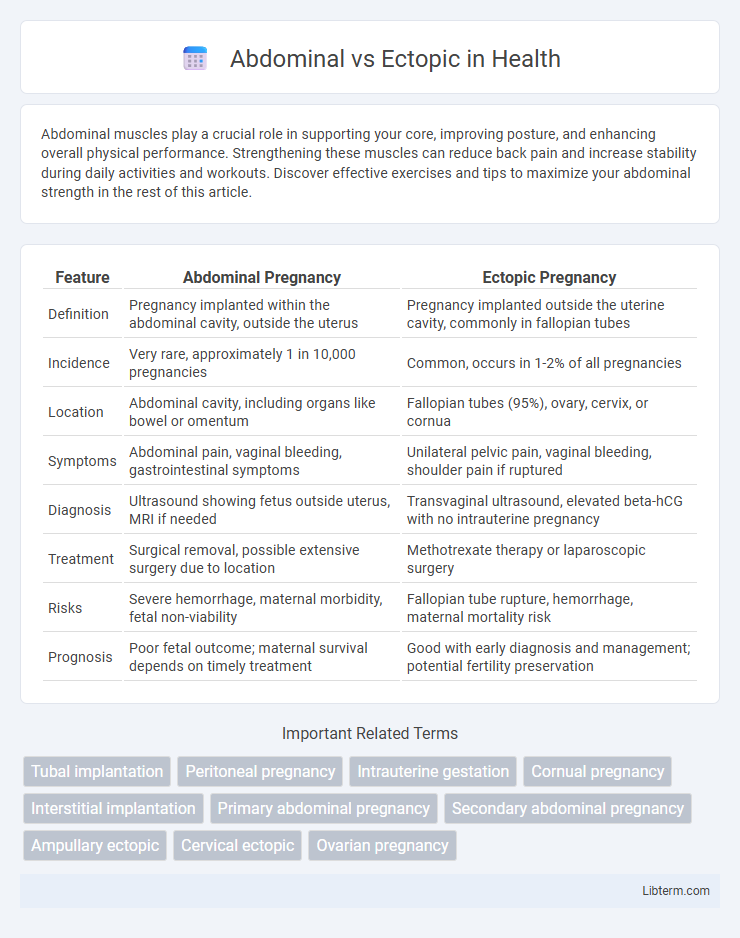Abdominal muscles play a crucial role in supporting your core, improving posture, and enhancing overall physical performance. Strengthening these muscles can reduce back pain and increase stability during daily activities and workouts. Discover effective exercises and tips to maximize your abdominal strength in the rest of this article.
Table of Comparison
| Feature | Abdominal Pregnancy | Ectopic Pregnancy |
|---|---|---|
| Definition | Pregnancy implanted within the abdominal cavity, outside the uterus | Pregnancy implanted outside the uterine cavity, commonly in fallopian tubes |
| Incidence | Very rare, approximately 1 in 10,000 pregnancies | Common, occurs in 1-2% of all pregnancies |
| Location | Abdominal cavity, including organs like bowel or omentum | Fallopian tubes (95%), ovary, cervix, or cornua |
| Symptoms | Abdominal pain, vaginal bleeding, gastrointestinal symptoms | Unilateral pelvic pain, vaginal bleeding, shoulder pain if ruptured |
| Diagnosis | Ultrasound showing fetus outside uterus, MRI if needed | Transvaginal ultrasound, elevated beta-hCG with no intrauterine pregnancy |
| Treatment | Surgical removal, possible extensive surgery due to location | Methotrexate therapy or laparoscopic surgery |
| Risks | Severe hemorrhage, maternal morbidity, fetal non-viability | Fallopian tube rupture, hemorrhage, maternal mortality risk |
| Prognosis | Poor fetal outcome; maternal survival depends on timely treatment | Good with early diagnosis and management; potential fertility preservation |
Understanding Abdominal Pregnancy
Abdominal pregnancy, a rare form of ectopic pregnancy, occurs when the fertilized egg implants within the peritoneal cavity outside the uterus, often attached to organs like the bowel or omentum. This condition poses significant risks due to potential hemorrhage and challenges in diagnosis, frequently confirmed through advanced ultrasound and MRI imaging. Early detection and surgical intervention are critical to manage complications and improve maternal outcomes in abdominal pregnancy cases.
What Is an Ectopic Pregnancy?
An ectopic pregnancy occurs when a fertilized egg implants outside the uterine cavity, most commonly in the fallopian tubes, causing serious health risks. Abdominal ectopic pregnancies implant within the peritoneal cavity, a rare and potentially life-threatening condition compared to the more frequent tubal ectopic pregnancies. Early diagnosis through transvaginal ultrasound and serum beta-hCG levels is critical for managing ectopic pregnancies and preventing complications such as rupture and hemorrhage.
Key Differences: Abdominal vs Ectopic Pregnancy
Abdominal pregnancy is a rare type of ectopic pregnancy where the embryo implants within the peritoneal cavity, whereas typical ectopic pregnancies most commonly occur in the fallopian tubes. Abdominal pregnancies pose higher risks of severe maternal complications due to potential placental attachment to vital abdominal organs. Diagnosis relies heavily on imaging techniques like ultrasound and MRI to differentiate between abdominal and other ectopic locations for appropriate management.
Causes and Risk Factors
Abdominal pregnancy, a rare form of ectopic pregnancy, occurs when the embryo implants within the peritoneal cavity rather than the uterus. Common causes include tubal damage from pelvic inflammatory disease, previous ectopic pregnancies, or surgery, increasing risk due to impaired embryo transport. Risk factors for ectopic pregnancies broadly encompass assisted reproductive technologies, smoking, advanced maternal age, and anatomical abnormalities of the fallopian tubes.
Common Symptoms to Watch For
Abdominal and ectopic pregnancies share common symptoms such as severe abdominal pain, vaginal bleeding, and dizziness or fainting, indicating a medical emergency. Both conditions often present with spotting, shoulder tip pain due to diaphragmatic irritation, and gastrointestinal disturbances like nausea or diarrhea. Early detection through ultrasound and monitoring of hCG levels is crucial to differentiate between abdominal and other ectopic pregnancies for timely intervention.
Diagnostic Approaches
Ultrasound imaging serves as the primary diagnostic tool for ectopic pregnancy, revealing the absence of an intrauterine gestational sac and the presence of adnexal masses. In contrast, diagnosing abdominal pregnancy relies heavily on magnetic resonance imaging (MRI) to identify implantation sites outside the uterus and assess vascular involvement. Serial measurement of serum beta-hCG levels aids in differentiating ectopic from intrauterine pregnancies, with plateauing or declining levels indicating abnormal gestation.
Treatment Options for Both Conditions
Treatment options for abdominal pregnancies typically involve surgical intervention, such as laparotomy or laparoscopy, to remove the ectopic gestation while minimizing damage to surrounding organs. Ectopic pregnancies located outside the abdominal cavity, such as tubal ectopics, are often managed with methotrexate medication if diagnosed early or surgically through salpingectomy or salpingostomy when medical management is unsuitable. Both conditions require careful monitoring of human chorionic gonadotropin (hCG) levels post-treatment to ensure complete resolution and prevent complications.
Complications and Prognosis
Abdominal pregnancies carry a higher risk of severe hemorrhage, organ damage, and infection due to implantation outside the uterus, often leading to complex surgical management and increased maternal morbidity. Ectopic pregnancies, including tubal and other extrauterine locations, frequently result in rupture, causing life-threatening intra-abdominal bleeding and necessitating emergency intervention. Prognosis for abdominal pregnancies is generally poorer compared to typical ectopic pregnancies, with higher rates of maternal morbidity and mortality, while early detection and treatment improve outcomes in most ectopic cases.
Preventive Measures and Early Detection
Preventive measures for abdominal and ectopic pregnancies include avoiding risk factors such as pelvic inflammatory disease, prior ectopic pregnancy, and use of assisted reproductive technologies. Early detection relies heavily on transvaginal ultrasound and serial measurement of beta-hCG levels to identify abnormal implantation sites promptly. Timely diagnosis allows for appropriate medical or surgical intervention, reducing complications and preserving fertility.
Frequently Asked Questions (FAQs)
Abdominal and ectopic pregnancies are types of abnormal pregnancies where the embryo implants outside the uterus, with abdominal pregnancies specifically occurring in the peritoneal cavity. Frequently asked questions often address symptoms such as abdominal pain, vaginal bleeding, and missed periods, as well as diagnostic methods like ultrasound and MRI used to differentiate the location of the pregnancy. Management queries include treatment options ranging from surgical intervention to medication, and risks related to maternal health complications and future fertility concerns.
Abdominal Infographic

 libterm.com
libterm.com